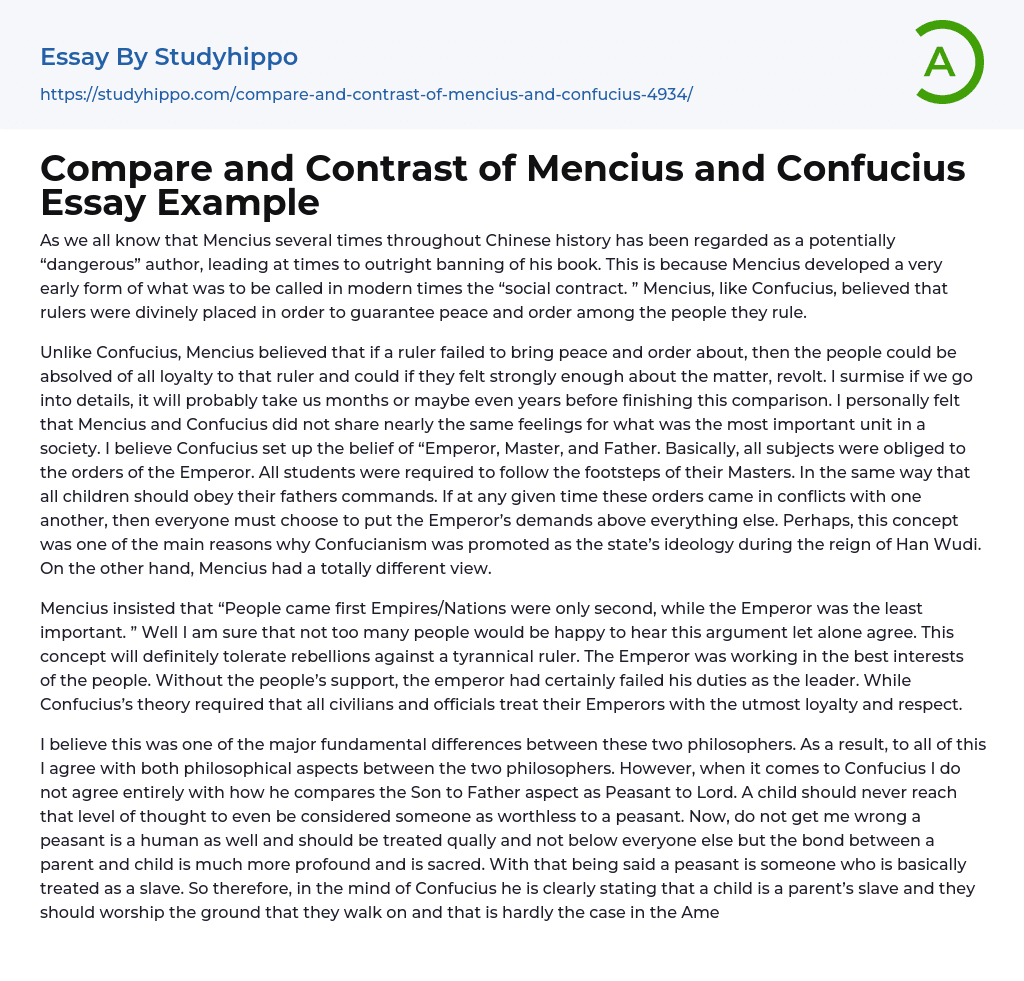As we all know that Mencius several times throughout Chinese history has been regarded as a potentially “dangerous” author, leading at times to outright banning of his book. This is because Mencius developed a very early form of what was to be called in modern times the “social contract. ” Mencius, like Confucius, believed that rulers were divinely placed in order to guarantee peace and order among the people they rule.
Unlike Confucius, Mencius believed that if a ruler failed to bring peace and order about, then the people could be absolved of all loyalty to that ruler and could if they felt strongly enough about the matter, revolt. I surmise if we go into details, it will probably take us months or maybe even years before finishing this comparison. I personally felt that Mencius and Confucius did not sha
...re nearly the same feelings for what was the most important unit in a society. I believe Confucius set up the belief of “Emperor, Master, and Father. Basically, all subjects were obliged to the orders of the Emperor. All students were required to follow the footsteps of their Masters. In the same way that all children should obey their fathers commands. If at any given time these orders came in conflicts with one another, then everyone must choose to put the Emperor’s demands above everything else. Perhaps, this concept was one of the main reasons why Confucianism was promoted as the state’s ideology during the reign of Han Wudi. On the other hand, Mencius had a totally different view.
Mencius insisted that “People came first Empires/Nations were only second, while the Emperor was the least important. ” Wel
I am sure that not too many people would be happy to hear this argument let alone agree. This concept will definitely tolerate rebellions against a tyrannical ruler. The Emperor was working in the best interests of the people. Without the people’s support, the emperor had certainly failed his duties as the leader. While Confucius’s theory required that all civilians and officials treat their Emperors with the utmost loyalty and respect.
I believe this was one of the major fundamental differences between these two philosophers. As a result, to all of this I agree with both philosophical aspects between the two philosophers. However, when it comes to Confucius I do not agree entirely with how he compares the Son to Father aspect as Peasant to Lord. A child should never reach that level of thought to even be considered someone as worthless to a peasant. Now, do not get me wrong a peasant is a human as well and should be treated qually and not below everyone else but the bond between a parent and child is much more profound and is sacred. With that being said a peasant is someone who is basically treated as a slave. So therefore, in the mind of Confucius he is clearly stating that a child is a parent’s slave and they should worship the ground that they walk on and that is hardly the case in the Americans society. A ruler should lead and set forth an example not to humiliate or torment a human being to satisfy their own egos or gratifications.
- Values of Life essays
- Ethical dilemma essays
- Normative Ethics essays
- Virtue Ethics essays
- Belief essays
- Deontology essays
- Moral essays
- Virtue essays
- Work Ethic essays
- Adaptation essays
- Adventure essays
- Adversity essays
- Aging essays
- Alcohol essays
- Barbie Doll essays
- Beauty essays
- Care essays
- Carpe diem essays
- Change essays
- Chess essays
- Chicken essays
- Choices essays
- Contrast essays
- Crops essays
- Development essays
- Dream essays
- Evil essays
- Experience essays
- Family essays
- Farm essays
- Fire essays
- First Love essays
- Focus essays
- Greed essays
- Hero essays
- Holiday essays
- House essays
- Housing essays
- Humility essays
- Humor essays
- Hypocrisy essays
- Integrity essays
- Law of Life essays
- Life Changing Experience essays
- Life Experience essays
- Lifestyle essays
- Limitations essays
- Love Story essays
- Mother Tongue essays
- Motherhood essays




